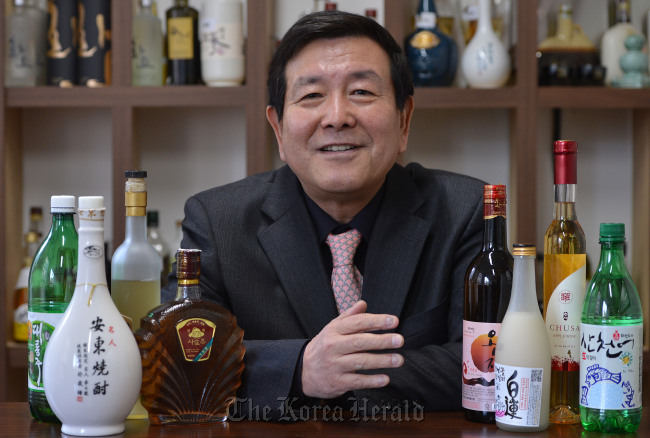Korean liquors charm foreign consumers
Government should redress misinformation to the overseas market, says head of lobby for traditional drinks
By Kim Yon-sePublished : Dec. 26, 2012 - 19:11
Diluted soju, a cheap alcohol product, has been taking up a great portion of the nation’s liquor market over the past few decades.
As Jinro and Lotte actively made inroads into the overseas market, more and more foreign drinkers could easily access the diluted soju along with makgeolli, a rice-based Korean drink.
While soju ― cheap through mass production ― has been playing the role of “placating ordinary citizens,” the Korean Traditional Alcoholic Beverage Development Association expressed worries over the situation.
“Some foreigners mistake diluted soju for the representative Korean traditional liquor. It is lamentable,” Roh Yeong-hwan, chairman of the association, said in an interview with The Korea Herald.
As Jinro and Lotte actively made inroads into the overseas market, more and more foreign drinkers could easily access the diluted soju along with makgeolli, a rice-based Korean drink.
While soju ― cheap through mass production ― has been playing the role of “placating ordinary citizens,” the Korean Traditional Alcoholic Beverage Development Association expressed worries over the situation.
“Some foreigners mistake diluted soju for the representative Korean traditional liquor. It is lamentable,” Roh Yeong-hwan, chairman of the association, said in an interview with The Korea Herald.

He stressed that Korea’s traditional soju is not a product made by the dilution of spirit but “distilled” products, such as Myeongin Andong Soju, Gosorisool and Moonbaesool.
He also expressed anxiety over the ingredients of diluted soju.
“While diluted soju makers had extracted alcohol from Korean sweet potatoes, they currently use substitutes including tapioca produced in Southeast Asia due to profitability matters.”
The chairman also commented on foreign buyers’ wide interest in the traditional liquors during an investor relations session in New York City, adding they were seemingly surprised by a variety of types according to producing methods and skills.
“Our samples for a liquor tasting event ran out in a few hours with high praise from foreign buyers. We had to see our stands filled with empty bottles despite continued demand for tasting,” he said.
Among Korea’s traditional liquors are distilled soju, general distilled liquor, fresh makgeolli, sterilized makgeolli, yakju herbal liquor, cheongju rice wine, fruit wine, liqueur and other provincial products.
Concerning makgeolli, the chairman said consumers should distinguish products made with imported rice from makgeolli made with Korean rice. Import-rice products account for a dominant position of the domestic market.
The chairman said it is time for policymakers to actively promote consumption and distribution of the “real” traditional alcohol products.
KTABDA, the lobby for traditional liquors, is pinning hopes on the role of the Agriculture Ministry, while the alcohol industry had been under sole supervision of the National Tax Service.
After the laws on promotion of traditional liquors passed the National Assembly in 2010, the association began holding contests in coordination with the Agriculture Ministry.
For the third consecutive year since 2010, the annual Korea Liquors Contest has been drawing growing interest among contestants, buyers and consumers.
“We’ve found that interest from consumers is quite high. The issue is the willingness of the government toward globalization of our liquors,” Roh said.
He said the beginning should be easy access of local consumers to traditional liquors at restaurants across the country.
“Consumers only drink diluted soju, import-rice makgeolli and beer at most restaurants. Consumers who want traditional products have no choice but to visit the liquor section of large discount chains,” he said.
“I hope that policymakers will promptly correct the situation that makes some foreigners look down on the Korean alcohol market where diluted soju, priced under 4,000 won ($3.80) per bottle at local restaurants, is being regarded as the main traditional product.”
By Kim Yon-se (kys@heraldcorp.com)







![[AtoZ Korean Mind] Does your job define who you are? Should it?](http://res.heraldm.com/phpwas/restmb_idxmake.php?idx=644&simg=/content/image/2024/05/06/20240506050099_0.jpg&u=)










